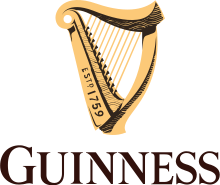
Back Guinness ANG غينيس (جعة) Arabic جينيس (بيره) ARZ Guinness AST Guinness BAR Guinness BE Guinness BE-X-OLD Гинес Bulgarian Guinness BR Guinness Catalan
 | |
| Type | Stout (beer) |
|---|---|
| Manufacturer | Diageo |
| Country of origin | Ireland |
| Introduced | 1759 |
| Alcohol by volume | 4.2% |
| Colour | Black (sometimes described as very dark ruby-red)[1] |
| Flavour | Dry |
| Website | guinness |
Guinness (/ˈɡɪnɪs/) is a stout that originated in the brewery of Arthur Guinness at St. James's Gate, Dublin, Ireland, in 1759. It is now owned by the British-based multinational alcoholic beverage maker Diageo. It is one of the most successful alcohol brands worldwide, brewed in almost 50 countries, and available in over 120.[2][3] Sales in 2011 amounted to 850,000,000 litres (190,000,000 imp gal; 220,000,000 U.S. gal).[2] In spite of declining consumption since 2001,[4] it is the best-selling alcoholic drink in Ireland[5] where Guinness & Co. Brewery makes almost €2 billion worth of beer annually.
The Guinness Storehouse is a tourist attraction at St. James's Gate Brewery in Dublin, Ireland. Since opening in 2000, it has received over 20 million visitors.
Guinness's flavour derives from malted barley and roasted unmalted barley, a relatively modern development, not becoming part of the grist until the mid-20th century. For many years, a portion of aged brew was blended with freshly brewed beer to give a sharp lactic acid flavour. Although Guinness's palate still features a characteristic "tang", the company has refused to confirm whether this type of blending still occurs. The draught beer's thick, creamy head comes from mixing the beer with nitrogen and carbon dioxide.[6]
The company moved its headquarters to London at the beginning of the Anglo-Irish trade war in 1932. In 1997, Guinness plc merged with Grand Metropolitan to form the multinational alcoholic-drinks producer Diageo plc, based in London.
- ^ "Frequently Asked Questions". Guinness.com. Guinness & Co. Archived from the original on 26 August 2010. Retrieved 22 August 2010.
- ^ a b "Famous Brewer Expands with National Launch of GUINNESS Black Lager – NORWALK, Conn., Aug. 24, 2011 /PRNewswire/" (Press release). Connecticut, Ireland: Prnewswire.com. Archived from the original on 6 July 2018. Retrieved 19 December 2011.
- ^ "Why Guinness is less Irish than you think". The Economist. 16 March 2014. Archived from the original on 28 November 2019. Retrieved 13 July 2017.
- ^ Fabb, Debbie (23 November 2007). "Last orders for Guinness?". BBC News. Archived from the original on 31 August 2017. Retrieved 23 September 2010.
- ^ Barry, Dan (28 August 2000). "In Ireland's Pubs, a Startling Trend". Lisdoonvarna Journal. The New York Times. Archived from the original on 11 December 2019. Retrieved 10 April 2008.
... Guinness stout remains the best-selling alcoholic beverage in Ireland, over the last year its consumption here has declined by nearly 4 percent.
- ^ Cite error: The named reference
ForeignExtraStoutwas invoked but never defined (see the help page).